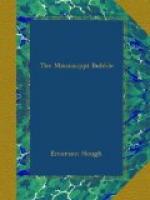Some weeks after the departure of Du Mesne, Law was returning from the hunt some miles below the station. His tall and powerful figure, hardened by continued outdoor exercise, was scarce bowed by the weight of the wild buck which he bore across his shoulders. His eye, accustomed to the instant readiness demanded in the voyageur’s life, glanced keenly about, taking in each item of the scene, each movement of the little bird on the tree, the rustling of the grass where a rabbit started from its form, the whisk of the gray squirrel’s tail on the limb far overhead.
The touch of autumn was now in the air. The leaves of the wild grapevine were falling. The oaks had donned garments of somber brown, the hickories had lost their leaves, while here and there along the river shores the flaming sentinels of the maples had changed their scarlet uniform for one of duller hue. The wild rice in the marshes had shed its grain upon the mud banks. The acorns were loosening in their cups. Fall in the West, gorgeous, beautiful, had now set in, of all the seasons of the year, that most loved by the huntsman.
This tall, lean man, clad in buckskin like a savage, brown almost as a savage, as active and as alert, seemed to fit not ill with these environments, nor to lack either confidence or contentment. He walked on steadily, following the path along the bayou bank, and at length paused for a moment, throwing down his burden and stooping to drink at the tiny pool made by the little rivulet which trickled down the face of the bluff. Here he bathed his face and hands in the cool stream, for the moment abandoning himself to that rest which the hunter earns. It was when at length he raised his head and turned to resume his burden that his suspicious eye caught a glimpse of something which sent him in a flash below the level of the grasses, and thence to the cover of a tree trunk.
As he gazed from his hiding-place he saw the tawny waters of the bayou broken into a long series of advancing ripples. Passing the fringe of wild rice, swimming down beneath the heavy cordage of the wild grapevines, there came on two canoes, roughly made of elm bark, in fashion which would have shown an older frontiersman full proof of their Western origin.
In the bow of the foremost boat, as Law could now clearly see, sat a slender young man, clad in the uniform, now soiled and faded, of a captain in the British army. His boat was propelled by four dusky paddlers, Indians of the East. Stalwart, powerful, silent, they sent the craft on down stream, their keen eyes glancing swiftly from one point to the other of the ever-changing panorama, yet finding nothing that would seem to warrant pause. Back of the first boat by a short distance came a kindred craft, its crew comprising two white men and two Indian paddlers. Of the white men, one might have been a petty officer, the other perhaps a private soldier.
It was, then, as Du Mesne had said. Every party bound into the West must pass this very point upon the river of the Illini. But why should these be present here? Were they friends or foes? So queried the watcher, tense and eager as a waiting panther, now crouched with straining eye behind the sheltering tree.




